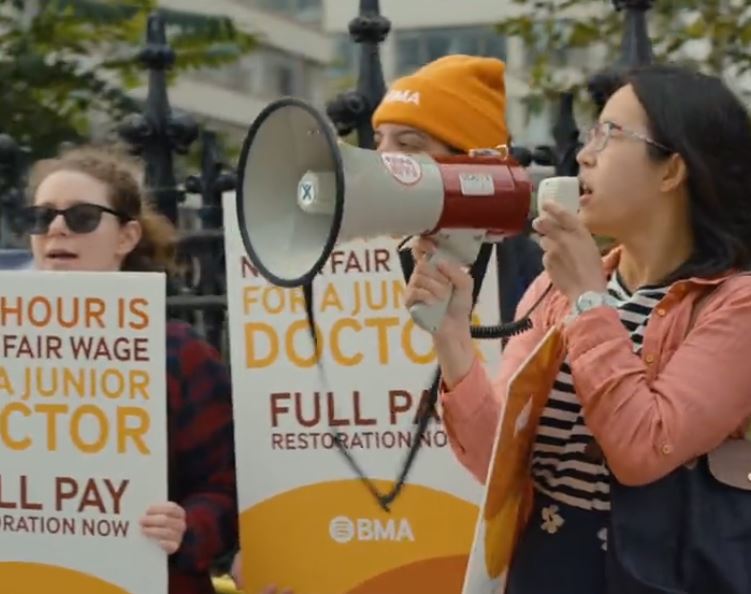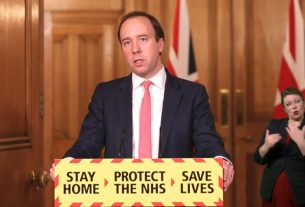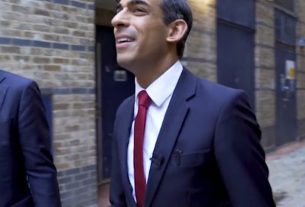A senior doctor has warned that ongoing NHS strikes are setting the health service up for a “terrifying” winter with a severe flu outbreak forecast and record waiting lists creating a “terrible cocktail” for patients and staff.
President of the Society for Acute Medicine Dr Tim Cookley criticised the government’s “intransigence” for refusing to negotiate with the doctors’ union, the BMA (British Medical Association) which will only worsen conditions in the NHS.
Rishi Sunak’s government repeated on Friday (July 14) that the 6% pay rise was their “final offer” and have refused to engage in talks with unions to settle the dispute. Cookley told the i the government’s stance will “will almost certainly mean a continuation of strike with inevitable disruption to patient care and inability to implement urgently needed plans to prevent the similar appalling scenes witnessed last winter being seen again this winter. This is terrifying.
“Urgent and emergency care systems remain under immense strain. Many acutely ill patients still receive good care. However, degrading and demoralising corridor care still permeates the system and is now ‘normal’.”
Cooksley warned that flu data from Australia “suggests we may be in for another winter spike” putting further pressures on an NHS already stretched to breaking point.
“Alongside continued strike action, this is a terrible cocktail,” said Cooksley. “We are heading for even more troubled times in the NHS.”
Junior doctors started their five day strike over pay this week (on Thursday July 13) and their industrial action will be followed by a two day strike by hospital consultants, due to start next Thursday (July 20).
It marks the longest ever strike by junior doctors in the NHS who walked out for three days last month. Their union, the British Medical Association, is demanding the “steep decline in pay they have faced since 2008-09” be reversed with a 35% pay award.
Junior doctors were offered 6% on Thursday for 2023-24 which was immediately rejected by the union which similarly rejected the 5% pay rise offered for 2022-23.
Junior doctors will return to work on Tuesday, two days before senior consultants begin their two-day strike. Radiographers are then set to strike on two days the following week (July 25-27). Nurses from the RCN (Royal College of Nursing) only called off their strike after a ballot failed to meet the threshold of votes to extend the mandate for further action.
The impact of the combined strikes, past and continuing, will require the rescheduling of hundreds of thousands of appointments and operations, adding further to waiting lists which have reached new records (see below).
Chief secretary to the Treasury John Glen has told junior doctors to get a “perspective” over their pay demands which could result in NHS frontline services being cut.
Glen – a former management consultant for Accenture who was first elected as an MP in 2010 – said the 35% pay demand is “completely unaffordable and out of kilter with pay growth in the wider economy”.
Agreeing to the doctors’ demands would “undermine all the other pay offers we have made, fuel inflation through borrowing or reduce frontline public services”.
“Junior doctors and NHS consultants may be feeling the pain of inflation like the rest of us”, said Glen, but added that “some perspective is badly needed” because of the significant sums that doctors stand to earn during their careers.
BMA Consultants, representing senior NHS doctors, called the government’s 6% pay offer an “insult to the profession” and said it “underscores why 86% of our consultant members in England voted to strike.”
Meanwhile, NHS waiting lists in England have reached a new record high with official data showing 7,470,000 people waiting for treatment at the end of May.
The longest strike in the NHS’ 75 history has contributed to the figures which showed a 50,000 increase between April and the end of May.
Elderly patients are “scared they’ll die before getting surgery because of strikes”, according to a former NHS trust chairman who criticised “juvenile” doctors for taking industrial action.
Martin Gower, former chair of the Midlands Partnership NHS Foundation Trust told TalkTV he has “nothing but contempt” for the British Medical Association’s “political journey” with the strikes by junior doctors.
Gower – who, on his LinkedIn page is recommended by a former vice-chancellor of Coventry University who calls him ”an exceptionally good communicator, who understands people and how to motivate them” – added that he hoped striking doctors attending festivals or barbecues in lieu of going to work got wet in the forecasted poor weather.




